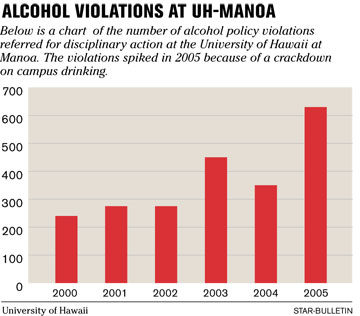
COURTESY OF UNIVERSITY OF HAWAII AT MANOA
This poster, and the one shown below, are part of the Manoa Alcohol Project at UH-Manoa aimed at combating binge drinking by college students. CLICK FOR LARGE
|
|
Project to fight UH drinking
Beer company to pick up tab for anti-booze project at UH
The University of Hawaii at Manoa will use surveys and posters to battle what one official called the "Animal House" image that colleges are places to party and drink to excess.
It is part of a $240,000, four-year effort to combat underage and binge drinking funded by the Anheuser-Busch Foundation.
But Mothers Against Drunk Driving Hawaii chapter spokeswoman Carol McNamee says MADD is concerned about UH taking money from a beer company for alcohol programs.
Surveys of alcohol use at the University of Hawaii at Manoa show binge drinking -- defined as having five or more drinks in one sitting -- is on the decline.
But the perception among many students is that college is a place to party.
The Manoa Alcohol Project at UH-Manoa is trying to combat underage and binge drinking by promoting the idea that drinking to excess is not the social norm.
Yesterday, UH officials, Attorney General Mark Bennett and John T. Kaestner, vice president for consumer affairs for Anheuser-Busch Cos. Inc., announced that the Anheuser-Busch Foundation will fund the Manoa Alcohol Project for the next four years and presented a check for $240,000 to UH.
The money will be used to train residence hall staff, for surveys of alcohol use on campus, and for posters and other promotional materials. It replaces a grant that expires this year from the U.S. Department of Education.
Mothers Against Drunk Driving was invited to be at yesterday's news conference but did not show up.
Carol McNamee, public policy director for MADD-Hawaii, said her organization is concerned about the university taking money from a beer company.
McNamee said it sends a mixed message, noting that Anheuser-Busch is starting to market a new flavored malt liquor called Spykes aimed at young people. The 2-ounce shot with flavors like "spicy lime" and "hot melon" is added to beer to make it taste better, McNamee said.

UH-MANOA ALCOHOL CONSUMPTION
In a survey of undergraduate students conducted at the University of Hawaii at Manoa in 2004, responses indicate that:
» 42 percent of undergraduate students did not use alcohol in the 30 days prior to taking the survey.
» 75 percent reported that they did not binge drink, or consume five or more drinks in one sitting, in the two weeks prior to reporting.
» 85 percent of the students who did drink reported that they were not physically injured, and 87 percent reported that they did not have unprotected sex.
» 7.4 percent reported academic impediments as a result of alcohol consumption.
In a survey of 275 entering freshmen in fall 2005:
» 30 reported that they did not use alcohol, in response to the question, "Do you drink alcoholic beverages?"
» 7 out of 10 freshmen living in residence halls reported that they did not binge drink, which has been defined as having five or more alcoholic drinks in one sitting, in a two-week period.
» Yet freshmen residents believe only 1 out of 100 UH-Manoa students did not drink in the last 30 days when, according to the survey, 1 out of 5 chose not to drink.
Source: Manoa Alcohol Project
|
|
"We understand the difficulty (to get funding)," McNamee said. "But we would prefer that other parts of the community would come forward to support alcohol programs at the university rather than the alcohol industry itself."
Interim Chancellor Denise Konan described the Anheuser-Busch grant as "a milestone in continuing efforts to provide a safe and secure living and learning environment on campus."
Konan said 91 students sought alcohol counseling in 2005, and 156 students got counseling last year. However, many of those students were sent to the health center because they violated alcohol policies.
The university has been cracking down on underage drinking on campus since 2005, banning alcohol in the freshman dorms and the Hale Noelani apartment complex.
A state auditor's report on UH student housing noted that the death of a student, who mixed alcohol with methadone, in 2002 and several incidents of alcohol poisoning in 2004 prompted the drinking crackdown.
Konan credits the no-alcohol policy with reducing alcohol-related problems in the dorms.
Dorm residents had mixed feelings about the anti-binge-drinking campaign.
Freshman Hunter Kwiatkowski said he thinks it is a good idea and believes his fellow underage students are fairly responsible about alcohol use.
But his friend Sam Yamasawa thinks there is a lot of underage and binge drinking, and sometimes driving. "There's definitely drinking and lots of it," Yamasawa said.

